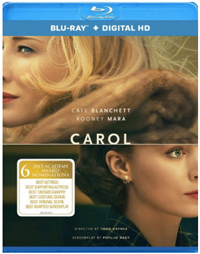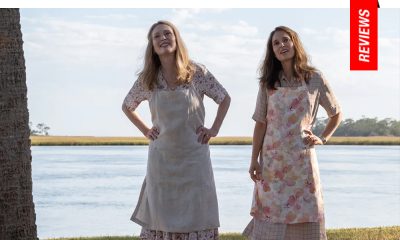Disc Reviews
Carol | Blu-ray Review
 A critical darling right out the gate of its premiere at the 2015 Cannes Film Festival, Todd Haynes’ Carol, was a clear Oscar front runner following Rooney Mara’s win for Best Actress at the fest (a distinction she shared with Emmanuelle Bercot, who also won for her performance in Mon Roi). Followed the title’s North American premiere at the New York Film Festival, an eventual awards campaign secured six Academy Award nominations, and allowed the film to be a prime candidate in an on-going debate as concerns what constitutes a ‘supporting’ role since Mara was relegated to the category to allow for Cate Blanchett to score a Best Actress nomination. Ultimately, despite an Indie Spirit Award for DP Ed Lachman and several various critics’ organizations distinctions, Haynes (oddly overlooked, once again, for a Directing nod at the Oscars) and company were locked out winning any of their major nominations, but the attention secured a decent box office domestic take, raking in over twelve million.
A critical darling right out the gate of its premiere at the 2015 Cannes Film Festival, Todd Haynes’ Carol, was a clear Oscar front runner following Rooney Mara’s win for Best Actress at the fest (a distinction she shared with Emmanuelle Bercot, who also won for her performance in Mon Roi). Followed the title’s North American premiere at the New York Film Festival, an eventual awards campaign secured six Academy Award nominations, and allowed the film to be a prime candidate in an on-going debate as concerns what constitutes a ‘supporting’ role since Mara was relegated to the category to allow for Cate Blanchett to score a Best Actress nomination. Ultimately, despite an Indie Spirit Award for DP Ed Lachman and several various critics’ organizations distinctions, Haynes (oddly overlooked, once again, for a Directing nod at the Oscars) and company were locked out winning any of their major nominations, but the attention secured a decent box office domestic take, raking in over twelve million.
A lavish period production design of 1950s New York finds the director returning to similar territory as seen in Far From Heaven and his mini-series remounting of “Mildred Pierce.” But whereas those films borrowed significantly from famous film texts, Haynes adapts a 1952 Patricia Highsmith novel, published under a pseudonym and described as a novel about persecuted love. Chilly, especially in comparison to the heterosexual classic Brief Encounter, of which the opening sequence has drawn reference to, Haynes has constructed a tightly wound ball of desire that is never given the opportunity to unravel.
In 1950’s New York, Therese Belivet (Mara) works as a department store clerk, though she has aspirations of being a photographer. Trapped in a one sided romance with her boyfriend (Jake Lacey), she is immediately fascinated by a customer one day at the store, a beautiful society woman, Carol Aird (Cate Blanchett). Circumstances allow the women to pursue a friendship and their obvious desire for one another. However, Carol is in the midst of a bitter divorce from her husband Harge (Kyle Chandler), a man jealous about Carol’s pattern of attraction to women, particularly Carol’s old flame, Abby (Sarah Paulson). As these two women becomes invested in one another, Therese begins to discover sides of herself previously unknown.
Bringing the novel to film in 2015 seems a curious endeavor, and while the film is pristine, with returning DoP Edward Lachman from Far From Heaven, this once subversive text feels antiquated in this presentation. A majority of the film resides in cool, muted greens, recalling the queer spaces of “Heaven,” with brief flashes of vibrant reds, generally seen when Blanchett’s feline seems to be on the prowl. Therese is pictured constantly looking out of rainy or speckled windows, always boxed neatly into a car, behind a counter, and into her appropriate class. But as portrayed by Rooney Mara, she’s never given a chance to be anything more than a big eyed kewpie doll, an echo of the Clara Bow “It” girl with bangs creepily reminiscent of Carol’s young daughter. Haynes never closes in on their passionate entanglement, though this is partially meant to convey Therese’s coming into her own identity.
As the titular object of desire, however, one could easily drink an exquisite Cate Blanchett up from the screen. Ravishing, she’s an actress that we easily believe hails from the period. It’s a pity that no chemistry is able to be built between their characters, a lacking substance from their very first encounter at the department store. Likewise, the stakes are never really high enough as concerns the possibility of how Carol’s sexuality will be used against her in order for her husband to keep custody of their child. We should feel a certain terror as there would have been more consequences in store for Carol besides just losing the child—she would inherit a social disease. With things wrapped up on that end too neatly, Harge’s bark being worse than his bite, it also steals the thunder away from the developing relationship of the women, including Sarah Paulson’s Abby, a strange, elusive figure Carol is able to dispatch at random.
Had this been adapted in a previous age, the language surrounding the women’s affair would have been coded, nothing revealed for certain, like the direct reference a character makes in the film to Sunset Boulevard. In our more enlightened times, their cinematic representatives engage in a mild love making sequence, their sexualities freely acknowledged, at least to the audience. And yet, Therese and Carol make for a completely lackluster pairing.
The novel, hailed for its ending, was miles away from similar queer literature of the period. The final sequence in Carol is equally nuanced and incredibly haunting. If only the development of their relationship didn’t feel so emotionless.
Disc Review:
Transferred in widescreen 1.85:1, the Anchor Bay Blu-ray presentation does justice to the film’s visual strengths, as does the Master Audio 5.1. It’s a handsomely mounted period piece, and this arrives with all its meticulous glory intact. Considering all the hubbub surrounding the title, one would’ve expected more special features than the requisite Q+A, but then, seeing its home entertainment release just weeks after awards season ended, perhaps enough is enough for the time being.
Q+A w/Cast and Filmmakers:
A half hour feature finds excerpts from a quarter of Q+A sessions, first with Pete Hammond moderating Mara and screenwriter Phyllis Nagy in a Los Angeles Q+A, followed by a New York David Fear moderated Q+A with Haynes, Blanchett, and Mara, and then another LA segment with Mara, Blanchett, Haynes and Jake Lacy. Lastly, another NY set with Joshua Rothkopf features Nagy, production designer Judy Becker, film editor Alfonso Goncalves, and composer Carter Burwell.
Final Thoughts:
Unreasonably chilly and isolating, the central romance never feels believable, but Blanchett’s titular performance is a wonderful portrait of manipulation. The initial wave of applause was too exuberant, and Carol is certainly not ‘a deeply felt love story,’ as it has been knighted by many a major outlet. Rather, Haynes explores an attraction tethered exclusively to the appearance of things, exploring a love never allowed to get beyond the definition of superficial.
Film Review: ★★★/☆☆☆☆☆
Disc Review: ★★★½/☆☆☆☆☆



































